Concrete Foundations
For a concrete pad or slab, BedRock Siteworks brings your site to a level grade. Concrete foundations are strong, durable, and the best solution for horse barns, pole barns, garages, cabins, and sun porches. The type of foundation that’s best for your situation depends on the type of building that you’re installing. We work with you to determine which of the concrete foundation options best meets your budget and is best for the characteristics of your site. For sloped area’s a retaining wall may be needed to extend the level area.
There are four types of concrete foundation designs: the Gibraltar, concrete pillars, floating slab, and graduated slab. Feel free to contact us for guidance through the process regarding specific detail’s on which foundation design may be best for your situation.
The Gibraltar Concrete Foundation
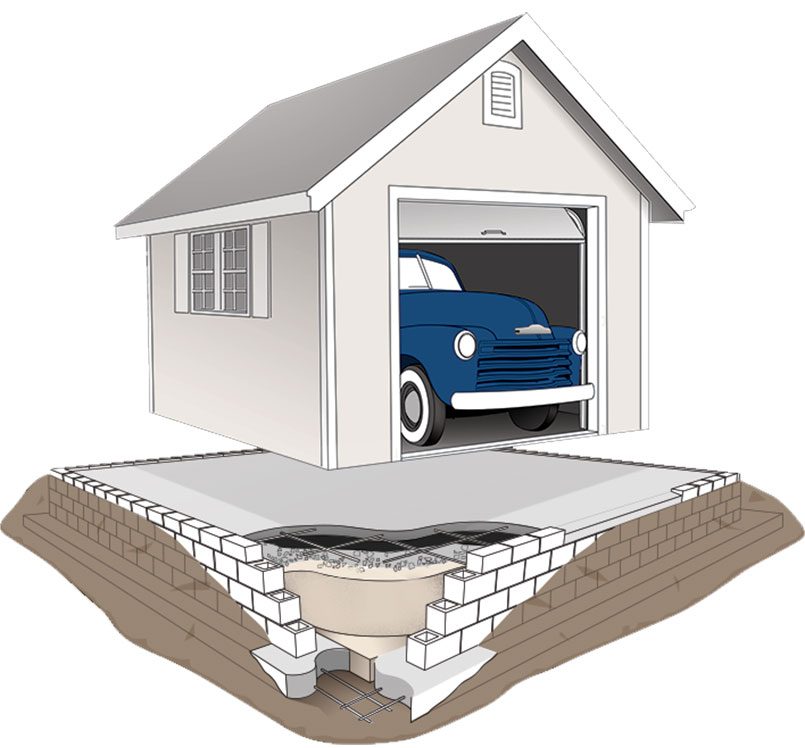
Firstly, we excavate the site. Then build a trench 24” wide X 36” deep that goes below the frost line. Afterwards a 24” x 8″ depth footer reinforced with rebar is added. Cement walls are poured, that are built up to 6″ above grade. Then installation of a 4″ gravel base for drainage, a vapor barrier to eliminate moisture and rebar is dialed into the cement wall for maximum strength. Lastly a concrete pad is poured and finished.
Concrete Pillars

First we excavate the site and dig holes 32″ to 36″ deep, by 16″ to 24″ diameter. A tube form is placed into the hole, rebar is inserted into forms for strength and then a concrete pour. Metal strapping is installed to finish off the pour and solidify the product.
Some townships require horse barns to rest on concrete pillars.
Floating Slab Foundation
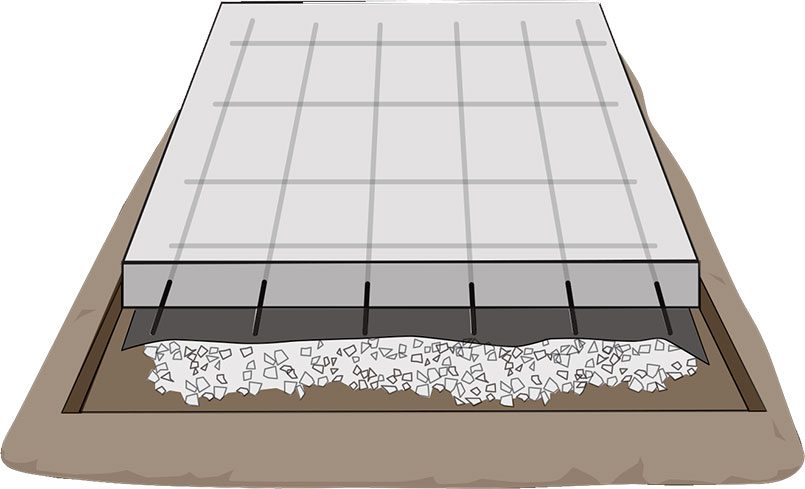
We excavate the site and install a 4″ gravel base for drainage and a vapor barrier to eliminate moisture. Rebar is added for structural integrity. Lastly the 4″ concrete slab is poured and finished.
Graduated Slab Foundation
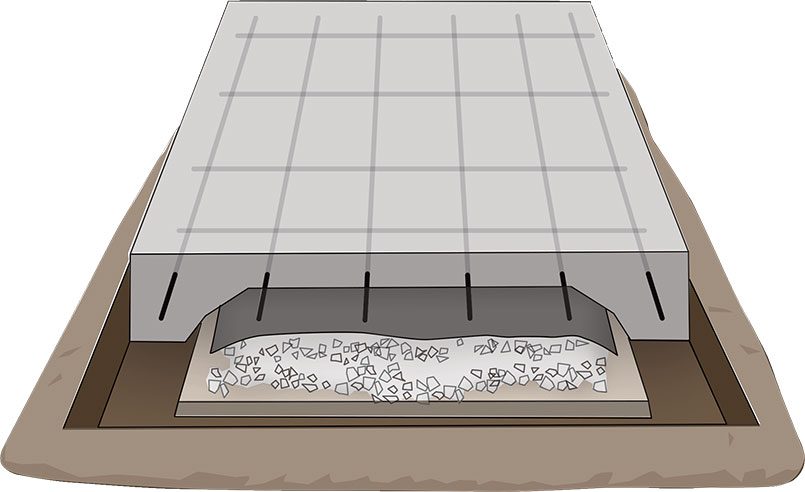
First we excavate the site and dig a trench with a 12″ to 18″ thickened edge. A 4″ gravel base is then installed for drainage, a vapor barrier to eliminate moisture, and rebar for structural integrity. Then a 4″ concrete pad is poured and finished.
Drainage and Erosion Solutions
(Storm Water Management)
Drainage Solutions
Proper grading is crucial to proper storm water management and erosion control. Drainage solutions are needed when you have;
- water problems or mold in your basement,
- a saturated yard,
- erosion,
- or standing water issues that lead to insect and mosquito problems.
Managing water and how it drains is absolutely necessary to protect your buildings and your property. A French drain is our most popular option for water management and is able to remediate problems from flash flooding.
Our Drainage Options
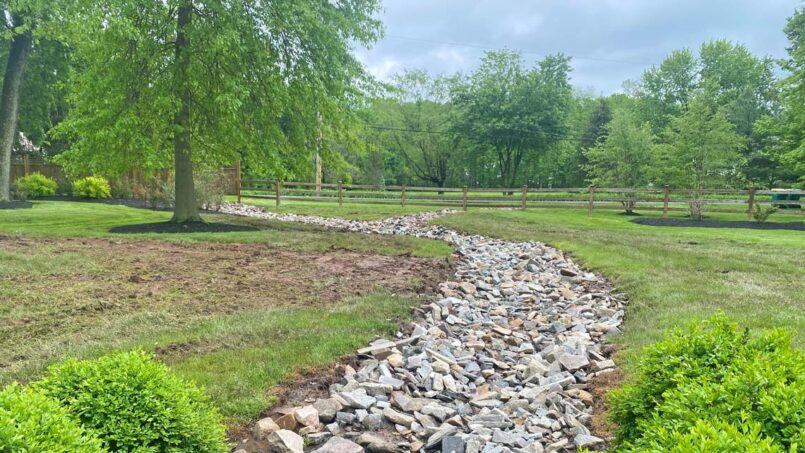
Dry Creek Bed
A dry creek bed funnels surface water from the edge of the property or the border of the structure. It works as a natural swale above ground to quickly divert surface water and can be aesthetically pleasing as well. Dry creek beds help to contain storm water and allow it to soak into the ground before it creates an erosion problem.
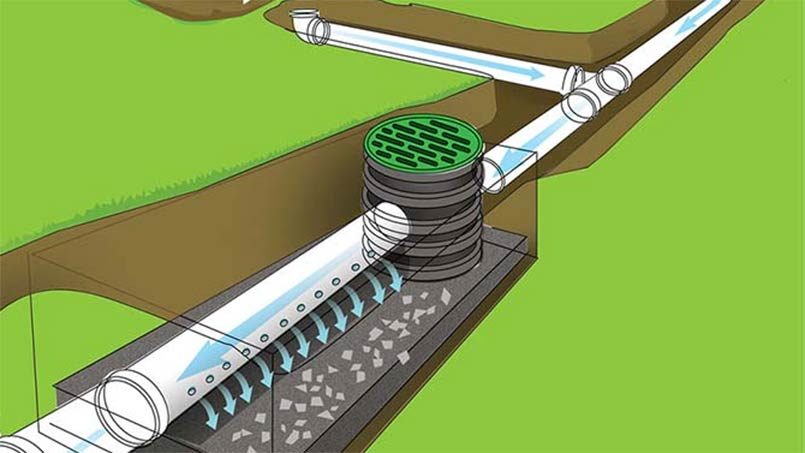
French Drain Filtration System
The French drain filtration system funnels runoff water from a roof or other surface into a piping system below ground. It is filtered through a clean-out enclosure with a removable lid, collecting any debris or sediment. The water permeates into the underground stone system.
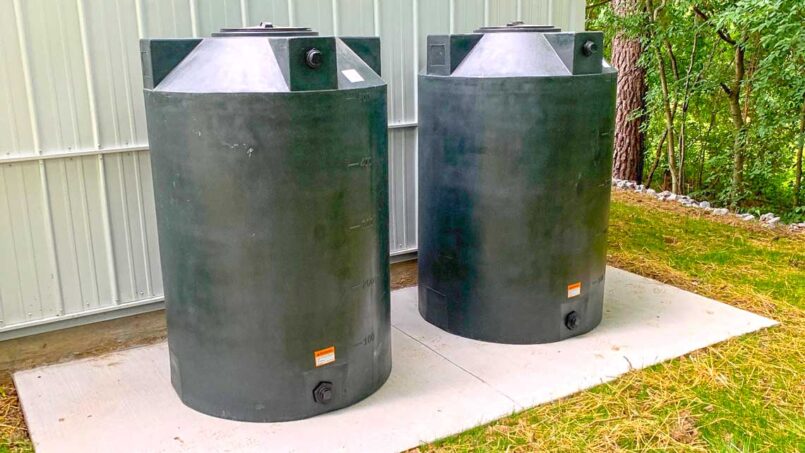
Pumped Storm Water Collection System
A pumped storm water collection system design is for conserving your own surface water. It features an underground holding tank and a pump. You can use the stored water and harvest it through the pumping system. This water can be reused to water your garden, fill your pool, or be redirected to an animal’s water trough.
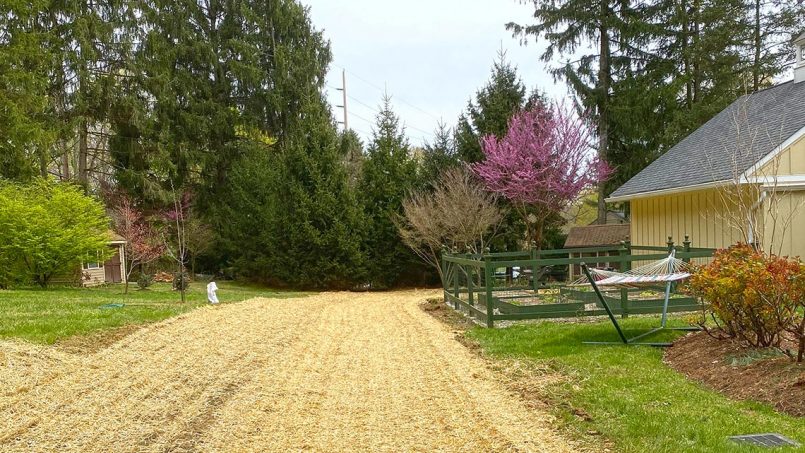
Storm Water Diversion System
The storm water diversion system diverts water away from a structure and safely contains it to control erosion. It takes impervious water off of the roof or other surface, redirecting it through underground pipe that takes water to an area where it can safely drain.
A project in Quakertown, PA uses a diversion system from the roof of a new shed into an adjacent pond. The perimeter banks of the pond help to contain the additional water and a new spill-way at the far end allows excess water to flow to an area of wetlands.
Equestrian Arenas
An equestrian arena is an outdoor or indoor enclosure for riding horses. An outdoor arena can be graded with ease in a designated space on your property. An indoor arena, while more costly, provides the added benefit of allowing riding activities without regard to the weather.
For both outdoor and indoor arenas, footing is an important characteristic to consider. Secure footing is required to protect the health and safety of horses and riders.
When planning for and excavating for an outdoor equestrian arena, proper drainage ensures a long life, stability for the surface, and lower maintenance costs.
In all cases, the excavation includes leveling and compaction of the site to insure a level solid base; grading the site according to the location of the arena.
Gravel and Concrete Driveways
Gravel Driveways
Gravel driveways are affordable and easy to customize. They take the least amount of time to install and minimally impact your daily routine. BedRock Siteworks guarantees proper installation and meticulous planning for proper drainage.
Gravel is ideal for longer driveways, but it is also more difficult than concrete to maintain due to weather, aging, and vegetation.
BedRock Siteworks does not build asphalt driveways.
Concrete Driveways
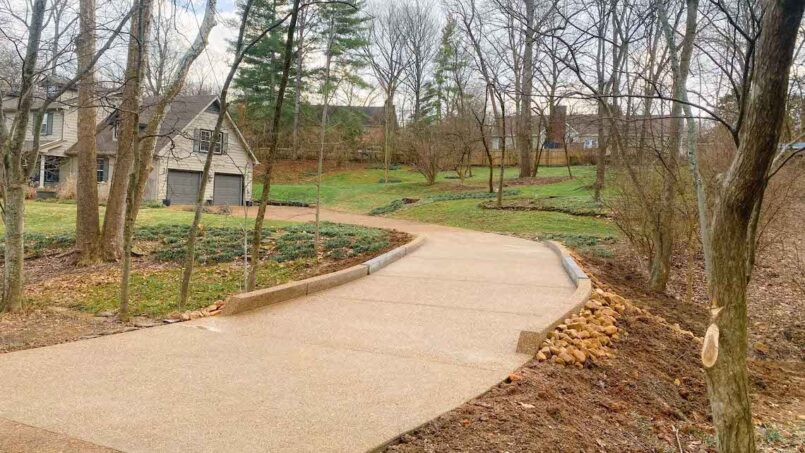
In contrast to its gravel counterpart, concrete driveways are stronger, more permanent, and more resistant to the elements. Ideal for residential use, our concrete driveways are able to withstand up to 3500 psi. This level of strength is possible because our concrete driveways are five inches thick and reinforced with either wire or rebar. As part of the installation process, our team; grades your surface, makes certain that it’s sloped properly, and fills the area with 4 inches of certified drain stone before pouring the concrete.
